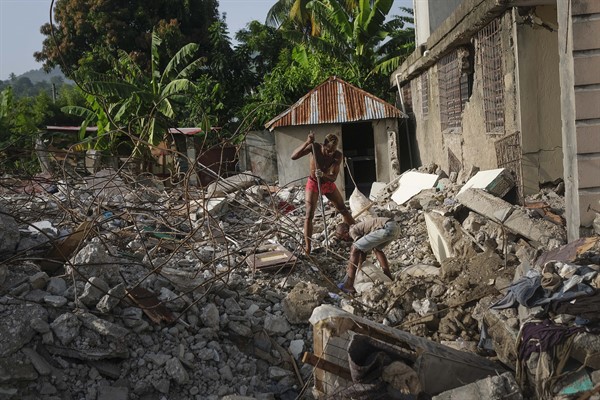Relief efforts are continuing in Haiti following the 7.2-magnitude earthquake that hit the country on Aug. 14, causing widespread destruction in the southern peninsula, near the quake’s epicenter. The death toll has surpassed 2,200, with 344 people still missing, according to the Haitian Civil Protection Agency. More than 12,000 people have been injured and nearly 53,000 houses destroyed.
The disaster occurred during a deep political crisis in Haiti, which took a tragic and unexpected turn when President Jovenel Moise was assassinated on July 7. Before that, Moise had been governing mainly through executive orders due to his failure to organize legislative elections, and he had been facing widespread demands for his resignation due to rampant corruption and mismanagement of the economy under his administration. The current acting president and prime minister, Ariel Henry, had been in office for less than a month when the earthquake occurred.
Given Haiti’s recent history, it is perhaps understandable that headlines about the country in recent years have focused on its cascading crises, now compounded by yet another major natural disaster. Yet too often overlooked in this coverage is the work being done by the country’s vibrant civil society, to put an end to corruption and poor governance and bring about a more just and equitable future for Haiti. This week on Trend Lines, WPR’s Elliot Waldman discusses these efforts with Monique Clesca, a Haitian writer, pro-democracy advocate and former United Nations official who is part of a recently formed group called the Commission to Search for a Haitian Solution to the Crisis.
If you would like to support earthquake recovery efforts in Haiti, please consider donating to the relief fund organized by FOKAL, a local NGO.
To request a full transcript of the episode, please send an email to podcast@worldpoliticsreview.com.
Listen:
Download: MP3
Relevant Articles on WPR:
Haiti Can Solve Its Own Problems, if Foreign Powers Would Let It
Haiti’s Crisis Is Familiar. Its History, Less So
Haiti’s Political Crisis Just Went From Bad to Worse
Haiti Is Slowly Becoming an Autocracy
Trend Lines is edited by Peter Dörrie, a freelance journalist and analyst focusing on security and resource politics in Africa. You can follow him on Twitter at @peterdoerrie.
To send feedback or questions, email us at podcast@worldpoliticsreview.com.




